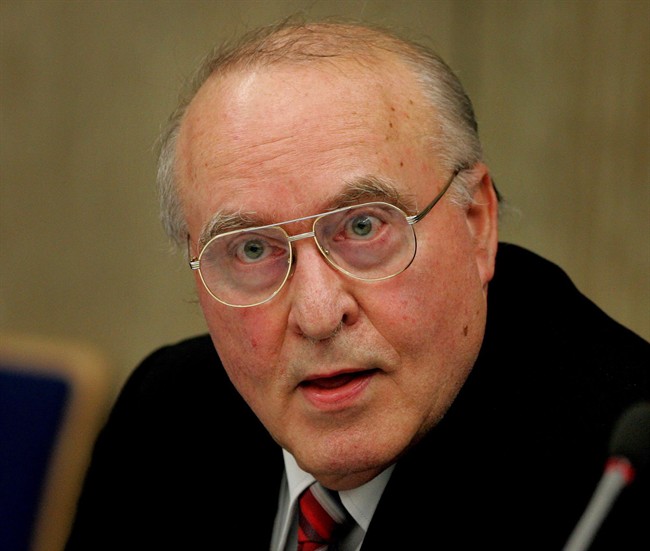BERLIN – Ernst Zundel, a “patriarch” of the white supremacist movement who served jail time in Germany for Holocaust denial after being deported from Canada, has died.

Zundel’s wife, Ingrid Zundel, said her husband died Saturday at his home in Black Forest Germany, where he was born.
German officials later confirmed his death.
Zundel, who was 78, was extradited in Canada in 2005 after earlier being deported from the United States for alleged immigration violations.
READ MORE: Marine Le Pen’s party in new turmoil over alleged Holocaust denial
A Canadian judge ruled that Zundel’s activities were a threat to national security as well as “the international community of nations,” clearing the way for his deportation to Germany later that year.
He was jailed the day he arrived in Germany, and was later convicted on 14 counts of inciting hatred for years of anti-Semitic activities, including contributing to a website devoted to denying the Holocaust – a crime in that country. He was served with the maximum sentence – five years behind bars, with credit for time served.
He was released from prison in 2010.
WATCH: Trump decries anti-Semitism, terrorism on Israel’s Holocaust Remembrance Day

Ingrid Zundel said she believed her husband died from a heart attack, but said she wasn’t sure of many of the details. She said his sister had found him unconscious and called for an ambulance.

Get daily National news
“I spoke to Ernst just hours before, and he was optimistic and upbeat as ever. There was no indication that anything was wrong,” Zundel wrote in the email.
Zundel had lived in both Toronto and Montreal for years after emigrating in 1958. He was rejected twice for Canadian citizenship and moved to Pigeon Forge, Tenn., but was sent back to Canada in 2003.
He came to public attention in the 1980s with several publications including “The Hitler We Loved.”
READ MORE: Siren wails as Israel marks annual Holocaust Remembrance Day
Two attempts at prosecution in Canada ultimately foundered when the Supreme Court of Canada struck down the country’s laws against spreading false news as a violation of free speech.
The trials catapulted the permanent resident into the public spotlight and Zundel became a familiar figure with his retinue of followers in Toronto.
Zundel continued publishing his beliefs online, on a website that remained up at the time of his death.
WATCH: Pro-life video comparing abortion to Holocaust slammed

He and his supporters had argued he was exercising his right to free speech. He was the subject of numerous threats and his home was once firebombed.
Federal Court Justice Pierre Blais in 2005 found Zundel to be a hatemonger who posed a threat to national security because of his close association with white supremacist and neo-Nazi groups that resorted to violence to press their causes.
LISTEN: Newstalk 770’s Rob Breakenridge on the impact of Zundel’s death.
A national security certificate released by the Canadian Security and Intelligence Service in 2003 said Zundel was then “considered one of the most notorious distributors of hate material in the world,” and referred to him as a patriarch of the white supremacist movement in Canada.
READ MORE: ‘Bookkeeper of Auschwitz’ fit to serve jail sentence at age 96: prosecutors
“Zundel was an unrepentant anti-Semite and defender of the evil Nazi regime, denying the Holocaust while at the same time fomenting hatred towards Jews,” said Shimon Koffler Fogel, CEO of the Centre for Israel and Jewish Affairs. “Zundel serves as a reminder of why civil society must remain vigilant in its battle with the purveyors of hate.”
WATCH: Appearance of holocaust denial posters rattle Calgary’s jewish community

He added that Zundel’s death will bring an “especially pernicious saga” to a close.
Upon his conviction in Germany in 2007, Bernie Farber, the chief executive officer of the Canadian Jewish Congress, called Zundel “one of the most renowned hatemongers.”
“That will be his final epitaph,” he said.







Comments